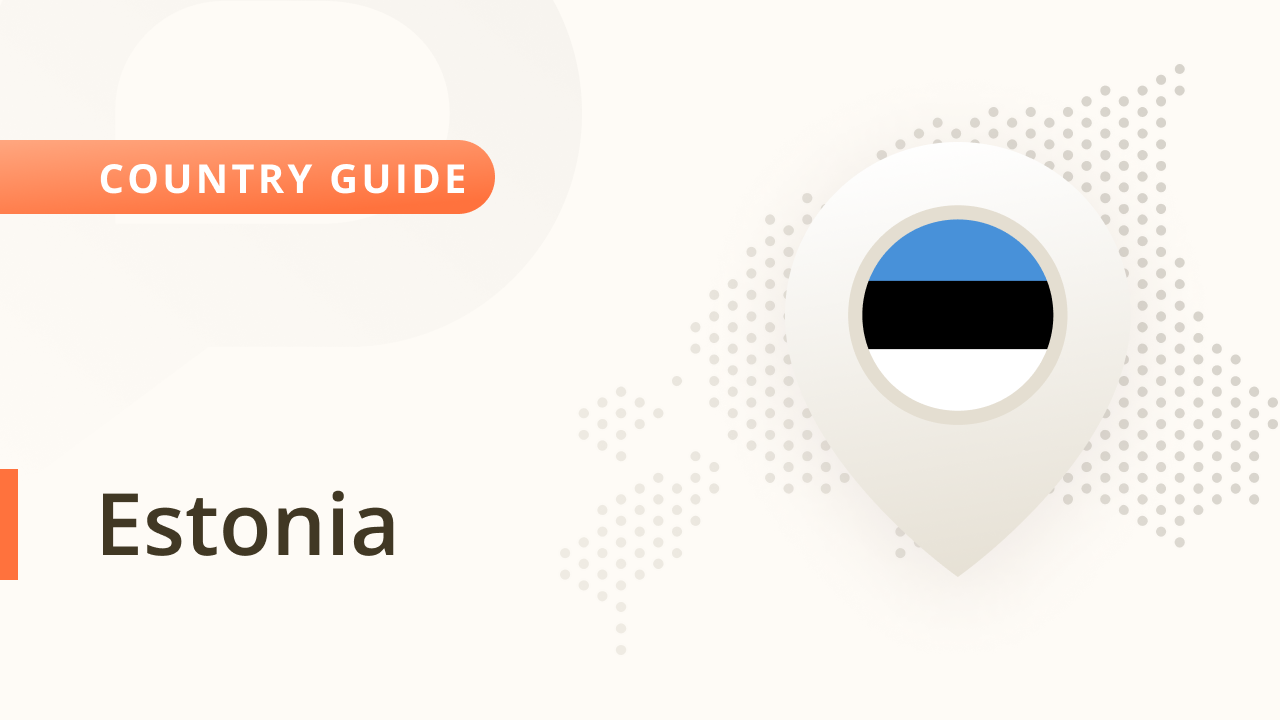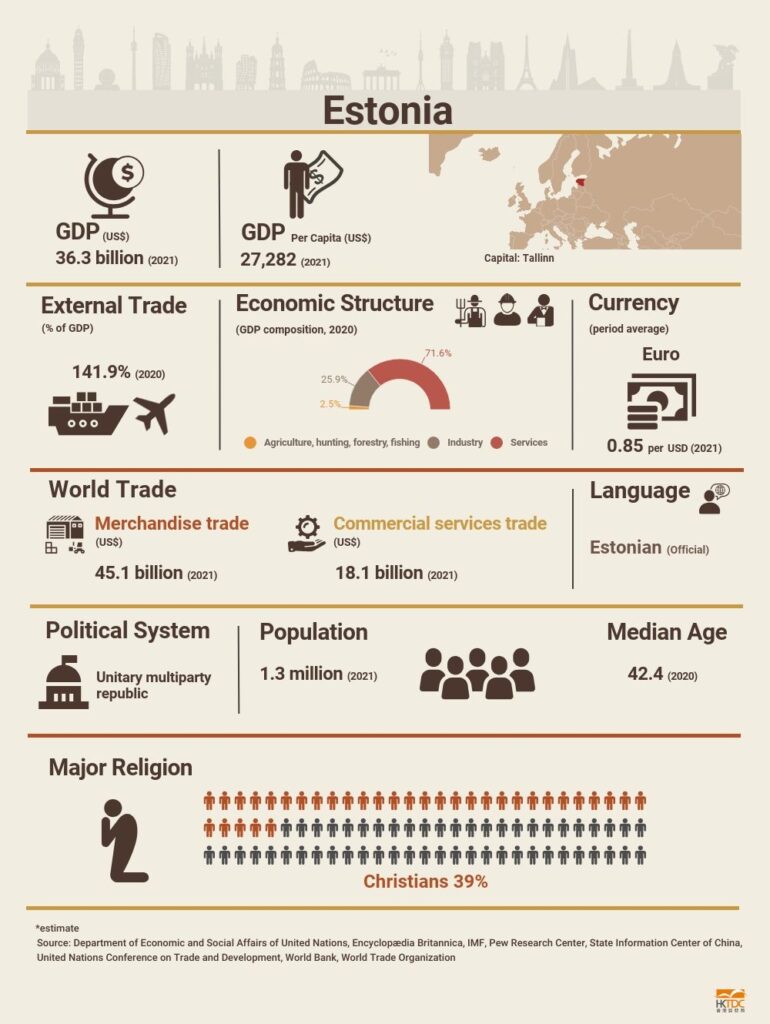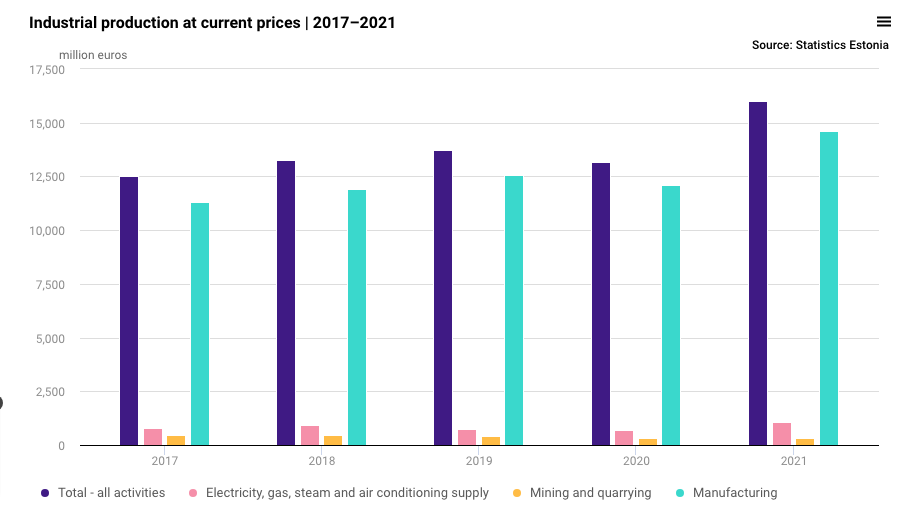Biotechnology is another promising industry in Estonia, encompassing numerous fields such as pharmaceuticals, diagnostics, and environmental protection. Estonian biotechnology companies often collaborate with research institutions, driving innovation and competitiveness in the industry.
While not its largest, Estonia’s mining industry still plays a significant role in the country’s economy, mainly due to oil shale extraction. Additionally, Estonia has phosphates and other mineral resources contributing to this industry.
The water supply and gas sectors provide essential services to the Estonian population and form the backbone for other industrial and domestic activities. This industry has seen substantial investments in infrastructure, technology, and improvements in service quality.
Another vital sector in Estonia is transport. The country’s strategic location along major trade routes in Northern Europe allows it to develop as a regional transport hub. Estonia’s transport sector encompasses maritime activities like shipbuilding and port services, as well as investments in modernizing rail and road networks.
Overall, Estonia boasts a dynamic economy with a diverse range of industries, each contributing uniquely to the country’s growth, competitiveness, and innovation.
Taxation in Estonia
Corporate Taxation
The corporate taxation system in Estonia is unique as it implements a 0% income tax on reinvested and retained profits for resident companies and the permanent establishments of foreign entities, including branches. Estonian companies are only subject to a 20% income tax on distributed profits, such as dividends and deemed distributions. This taxation structure encourages businesses to reinvest their earnings, fostering growth and development within the country.
Income Tax System
The Estonian income tax system follows a flat rate of 20% on personal income tax. Additionally, there are social tax contributions to consider: a 33% social tax, an unemployment contribution of 1.6% withheld by the company, and a 0.8% contribution applied to the gross salary. In certain cases, if the corporate income tax is paid at a 14% reduced rate, personal income tax is adjusted to 7%. This flat-rate system simplifies the tax process for individuals and businesses, reducing administrative burdens.
OECD Tax Competitiveness Index
Estonia ranks highly on the OECD Tax Competitiveness Index, consistently scoring as one of the most competitive tax systems in the developed world. This is mainly attributed to its straightforward tax structure, including the unique corporate taxation policy and the flat-rate income tax system. These competitive tax policies make Estonia an attractive destination for businesses and foreign investment.
Legal Framework and Compliance
Estonia’s legal system is based on the Continental European civil law model and has been influenced by the German legal system. Unlike common law countries, Estonian law features detailed modifications, enabling the resolution of issues by these modifications.
The legal system in Estonia is primarily divided into private and public law. Private law comprises civil and commercial law, whereas public law encompasses administrative, criminal, and constitutional law. The Estonian court system is organized into three levels: county and administrative courts, circuit courts, and the Supreme Court.
Estonia has made commendable progress in corruption control, ranking highly on Transparency International’s Corruption Perceptions Index. The country has stringent laws to combat corruption and bribery, illustrating its commitment to maintaining an ethical and transparent business environment.
Foreign investors have equal rights and obligations as local entrepreneurs in Estonia. All foreign investors can establish companies and conduct business in the country without any significant restrictions. Additionally, Estonia complies with the EU Foreign Investment Screening Regulation, ensuring a level playing field for businesses from other European Union member states.
In summary, Estonia’s legal framework and compliance landscape provide a conducive environment for doing business. The country’s commitment to maintaining a transparent and fair environment and adherence to the Continental European civil law model make it an attractive destination for foreign investors. Furthermore, the robust and well-structured court system ensures that businesses can rely on the legal system for dispute resolution and enforcement of contracts.
Technology and Innovation
Estonia has emerged as one of the world’s most advanced digital societies, adopting various technological solutions like electronic voting, online learning in schools, digital bureaucracy, and healthcare. This has allowed the country to provide uninterrupted digital public services during unprecedented events like the COVID-19 pandemic.
Information and Communication Technology (ICT) has taken center stage in Estonia’s digital transformation. The nation has been proactive in adopting and nurturing innovations in various aspects of public life, such as becoming the first country in the EU to legalize the road-testing of autonomous vehicles. Estonia’s digital ecosystem continues growing, creating a seamless society integrating ICT into daily life.
As part of Estonia’s commitment to innovation, the government has established a unique model known as e-Estonia, where the entire political culture is centered on technological advancements. This approach, which some might call policy entrepreneurship, has led to the branding of Estonia as an innovation hub. One of the key decisions under this model was adopting a flat tax in 1994, making Estonia the first country to implement such a policy.
Estonia reinforces its innovation goals by strategically focusing on research and development (R&D). The country aims to build stronger absorptive capacities and involve academic and business sectors. To achieve this, Enterprise Estonia has become an innovation agency, building new technological and programming skills.
The country’s commitment to progress in IT and innovation has earned Estonia a high ranking on the Global Innovation Index. This reflects Estonia’s ability to foster and sustain a technological adoption and development culture that has and will continue to, significantly impact its business environment. Efforts like these further solidify Estonia’s position as a leading player in the global technological landscape.
Estonian Infrastructure
Estonia offers a modern and well-developed infrastructure that facilitates business operations. Its capital, Tallinn, is the largest city and an important hub for commerce, which offers various benefits to entrepreneurs and investors alike.
In terms of transport, the country has a comprehensive network of ports, railroads, and roadways. Estonia’s strategic location in the Baltic region ensures easy access to major transport routes, connecting it to neighboring countries and international markets. Several ports are available around the country, with the Port of Tallinn being the largest and most advanced, playing a significant role in Estonia’s economic development.
Rail transportation is efficient and well-organized in Estonia, with an extensive railroad network connecting major cities and industrial areas domestically and internationally. The improved railway lines enable smooth cross-border transportation, primarily with Russia, Latvia, and Lithuania. Road transportation is equally efficient, with well-maintained highways and roads that enable easy and fast movement of goods and people within the country.
Estonia’s waterways also play an important role in its infrastructure system. The country is blessed with numerous rivers and lakes that are navigable year-round. Although waterborne transportation is not the primary means of transport, it does contribute to Estonia’s ability to transport goods and provide a practical solution for logistics and supply chain operations.
The country has invested heavily in developing its telecommunications infrastructure, earning a reputation as a digital leader in the region. Estonia is considered the most advanced digital society in the world, boasting strong digital infrastructure and extensive e-government services. This achievement results in time and cost savings for businesses and fosters a transparent and secure ecosystem for digital transactions.
In conclusion, Estonia’s well-developed and efficient infrastructure presents a conducive environment for businesses to thrive. The country’s strategic geographical position, modern transport network, and cutting-edge digital infrastructure offer entrepreneurs and investors a competitive edge in the global market.
Conclusion
If you’re considering doing business in Estonia, several organizations and agencies can provide valuable assistance and guidance. One important organization to contact is the Estonian Investment Agency (EIA). The EIA offers essential support by providing information on the Estonian business environment, investment opportunities, and advice on setting up businesses. You can get in touch with them through their official website.
Another valuable resource is the American Chamber of Commerce in Estonia (AmCham Estonia). As a leading business organization, AmCham Estonia promotes the interests of U.S. and Estonian companies. Their in-depth knowledge and experience in bilateral trade and investment can be instrumental in helping you expand your business in Estonia. To contact AmCham Estonia, visit their website and fill out the provided contact form.
Finally, you can always contact Estonian government agencies if you have any specific questions or need advice about doing business in Estonia. They offer various tailored services and cooperation possibilities for businesses. Business-related inquiries can be directed to the official Estonian government website.
In conclusion, when starting or expanding your business in Estonia, remember to take advantage of the support offered by various organizations like the EIA, AmCham Estonia, and the Estonian government. By reaching out to these entities, you can receive valuable assistance and guidance to help ensure your business’s success in Estonia.




